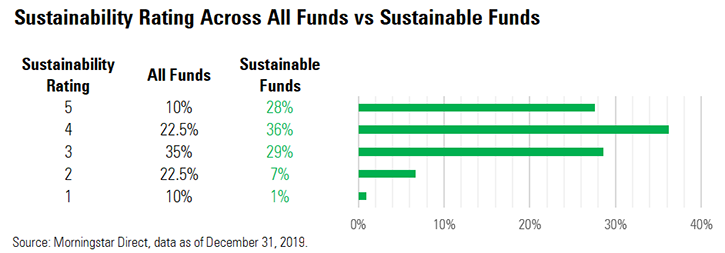Funds categorised as ESG or Sustainable have wide and varied approaches to investment and can be difficult to compare. Morningstar's definitions of the main types can be found here.
But judging how sustainable a fund truly is can be difficult; those perceived to fall short of the mark are often accused of greenwashing, purposely making themselves sound more ESG-focused than they really are. At a company level this could see businesses exaggerating their energy-saving credentials or use of recycle materials in their products to win over customers.
The Morningstar Sustainability Rating can help here: it is a holdings-based rating, so can show what funds are actually investing in and how this differs from their peers. Funds are classified on a scale from one to five globes, which are awarded based on a fund's sustainability relative to its Morningstar Category as a whole. Funds are also rewarded for selecting companies in lower ESG-risk industries and the lowest ESG-risk companies in any industry.
We have looked at 106 designated sustainable funds with a Morningstar Sustainability Rating and found more than half (64%) achieved the highest ratings, with four or five globes, compared with only a third of funds in the overall universe (including non-sustainable funds). Just 8% of sustainable equity funds received the lowest rating of one or two globes, compared with a third of total funds in the overall universe. Some 29% are rated three globes, which is equal to average.

Is Your Sustainable Fund Fossil Fuel Free?
Many sustainable equity funds claim to focus on climate change, an issue which has particularly shot up the corporate agenda over the past year or so. We have looked at how sustainable equity funds are positioned on climate change.
“Because climate change is such a big issue and one that is closely associated with sustainability, we may expect many sustainable funds to be fossil-fuel-free and most to have a lower carbon footprint than conventional funds,” points out Jon Hale, head of sustainability research at Morningstar.
The Morningstar Low Carbon Designation is assigned only to portfolios that have low carbon-risk scores and low levels of fossil-fuel exposure. The designation is an indicator that the companies held in a portfolio are in general alignment with the transition to a low-carbon economy. In essence, it looks at how well the companies a fund invest in are managing their exposure to climate risk by limiting carbon emission and minimising the costs of switching to new technologies. To calculate the portfolio carbon-risk scores, Morningstar uses Sustainalytics’ company carbon-risk ratings.
Of the 106 sustainable funds analysed, just 13 scored in the Low Carbon/Fossil-Fuel Free Morningstar list - which equates to around 12% of sustainable funds overall. Among these are Pictet Clean Energy, Invesco Funds Pan European Structured Responsible Equity and Heptagon European Focus Equity.
|
Name |
Sustainability Rating |
Low Carbon/ |
|
Trojan Ethical Income Fund |
4 |
Yes |
|
Pictet-Nutrition |
5 |
Yes |
|
MorganStanley US Advantage |
5 |
Yes |
|
Stewart Inv Gbl EM Sust'ble |
4 |
Yes |
|
RobecoSAM Sustainable Healthy Living |
5 |
Yes |
|
Pictet Global Environ'l Opps |
3 |
Yes |
|
Pictet-Security |
4 |
Yes |
|
Brown Adv US Sust'ble Grwth |
3 |
Yes |
|
Pictet-Timber |
4 |
Yes |
|
Axa WF Fram Eurozone |
5 |
Yes |




























